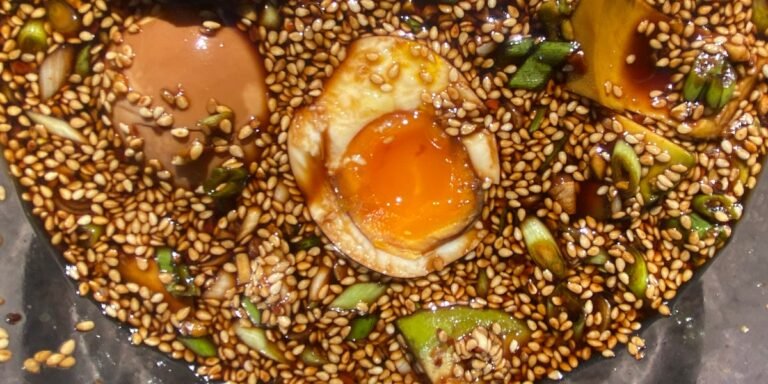Soy Marinated Eggs: A Complete Guide to Making This Delicious Asian Delicacy
Soy marinated eggs, also known as shoyu tamago or ramen eggs, are a delectable Asian dish that combines the richness of soft-boiled eggs with a savory soy sauce marinade. This comprehensive guide will walk you through everything you need to know about creating these flavorful treats at home.
What Are Soy Marinated Eggs?
Soy marinated eggs are perfectly cooked eggs that have been peeled and soaked in a flavorful marinade primarily consisting of soy sauce and other complementary ingredients. Originally popularized in Japanese cuisine as a ramen topping, these eggs have gained worldwide recognition for their unique taste and versatile applications.
The History and Cultural Significance
The tradition of marinating eggs in soy sauce originated in East Asia, particularly in Japan and China. In Japanese cuisine, these eggs are often served as a topping for ramen or enjoyed as a protein-rich snack. The technique of marinating eggs has been perfected over generations, resulting in the beloved dish we know today.
Essential Ingredients for Soy Marinated Eggs
To create authentic soy marinated eggs, you’ll need:
- Fresh eggs – Preferably large-sized eggs at room temperature for consistent cooking
- Soy sauce – High-quality Japanese or Chinese soy sauce for the best flavor profile
- Mirin – A sweet rice wine that adds complexity to the marinade
- Rice vinegar – Provides a subtle tang and helps balance the flavors
- Ginger – Fresh ginger adds a warming, aromatic note
- Garlic – Enhances the umami flavor of the marinade
- Water – To dilute the marinade and prevent it from becoming too salty
If you’re looking for more Asian-inspired recipes and cooking tips, visit 10for10 for an extensive collection of authentic recipes.
Step-by-Step Preparation Method
1. Cooking the Perfect Eggs
The foundation of excellent soy marinated eggs lies in properly cooking the eggs. Here’s how:
- Bring a pot of water to a gentle boil
- Carefully lower room-temperature eggs into the water
- Cook for exactly 6.5 minutes for jammy yolks, or 7 minutes for slightly firmer results
- Immediately transfer eggs to an ice bath to stop the cooking process
2. Creating the Marinade
The marinade is crucial for achieving the signature flavor of soy marinated eggs:
- Combine equal parts soy sauce and water
- Add mirin, rice vinegar, sliced ginger, and crushed garlic
- Heat the mixture until it just starts to simmer
- Allow it to cool completely before using
3. The Marination Process
Proper marination is key to developing the desired flavor and appearance:
- Carefully peel the cooled eggs
- Place them in the cooled marinade
- Ensure eggs are fully submerged
- Refrigerate for 4-24 hours, depending on desired intensity
Tips for Perfect Soy Marinated Eggs
To achieve the best results when making soy marinated eggs:
- Use fresh eggs that are at least a week old for easier peeling
- Don’t skip the ice bath step after cooking
- Strain the marinade before using to remove solid ingredients
- Store eggs in an airtight container while marinating
- Rotate eggs occasionally for even flavor distribution
Storage and Shelf Life
Proper storage is essential for maintaining the quality of soy marinated eggs:
- Keep marinated eggs refrigerated at all times
- Consume within 4 days of preparation
- Store remaining marinade separately for future use
- Don’t reuse marinade more than twice
Serving Suggestions
Soy marinated eggs are incredibly versatile and can be enjoyed in various ways:
- As a topping for ramen or udon noodle soups
- Sliced in half and served over rice bowls
- Added to Asian-inspired salads
- Enjoyed as a protein-rich snack
- Incorporated into bento boxes
Nutritional Benefits
Soy marinated eggs offer several nutritional advantages:
- High-quality protein from both the eggs and soy sauce
- Essential amino acids necessary for muscle maintenance
- Healthy fats from the egg yolks
- Important vitamins including B12, D, and E
- Minerals such as iron and selenium
Common Troubleshooting
When making soy marinated eggs, you might encounter these issues:
- Difficulty peeling eggs – Use slightly older eggs and ensure proper ice bath technique
- Too salty marinade – Adjust the water-to-soy sauce ratio
- Uneven coloring – Rotate eggs during marination
- Overcooked eggs – Strictly time the cooking process
- Rubbery whites – Don’t marinate for longer than 24 hours
Variations and Adaptations
While traditional soy marinated eggs are delicious, there are several variations to explore:
- Add star anise or cinnamon for a Chinese-inspired flavor
- Incorporate chili oil or Korean gochugaru for heat
- Use dark soy sauce for deeper color and flavor
- Add brown sugar or honey for sweetness
- Include sake or Chinese cooking wine for depth
The Science Behind the Magic
Understanding the science of soy marinated eggs can help perfect your technique:
- The proteins in egg whites react with the marinade, creating the characteristic brown exterior
- Osmosis draws the flavors into the eggs over time
- The acid in the marinade helps tenderize the egg whites
- Temperature control affects the final texture of both white and yolk
Cultural Impact and Modern Popularity
Soy marinated eggs have transcended their traditional roots:
- Featured in international food blogs and cooking shows
- Popular on social media platforms
- Adapted by Western chefs in fusion cuisine
- Available in specialty food stores worldwide
- Inspiring new variations and interpretations
Sustainability and Ethical Considerations
When preparing soy marinated eggs, consider:
- Using free-range or organic eggs
- Choosing sustainably produced soy sauce
- Minimizing waste by reusing marinade
- Supporting local egg producers
- Using eco-friendly storage containers
Conclusion
Soy marinated eggs represent a perfect harmony of simplicity and complexity in cooking. With the right technique and quality ingredients, anyone can create these flavorful eggs at home. Whether you’re adding them to ramen, enjoying them as a snack, or experimenting with new variations, soy marinated eggs offer a delicious way to explore Asian cuisine.
Remember that practice makes perfect when creating soy marinated eggs. Don’t be discouraged if your first attempt isn’t exactly as planned – each batch is an opportunity to refine your technique and develop your perfect recipe. With time and patience, you’ll master this beloved dish and add it to your regular cooking repertoire.







